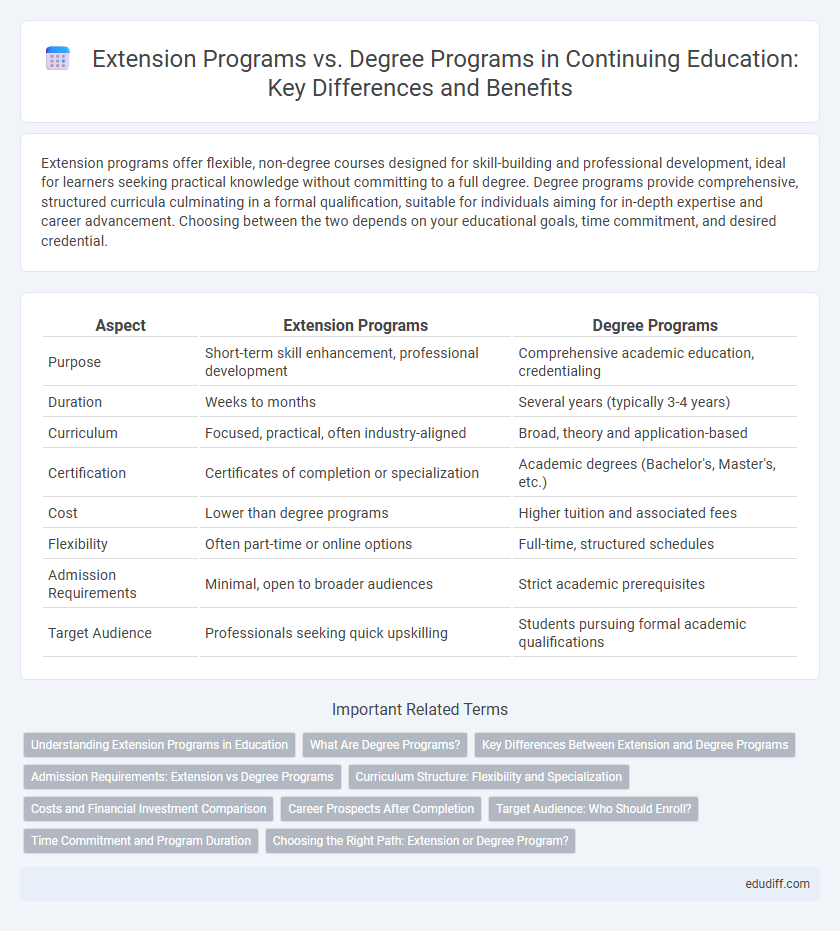Extension programs offer flexible, non-degree courses designed for skill-building and professional development, ideal for learners seeking practical knowledge without committing to a full degree. Degree programs provide comprehensive, structured curricula culminating in a formal qualification, suitable for individuals aiming for in-depth expertise and career advancement. Choosing between the two depends on your educational goals, time commitment, and desired credential.
Table of Comparison
| Aspect | Extension Programs | Degree Programs |
|---|---|---|
| Purpose | Short-term skill enhancement, professional development | Comprehensive academic education, credentialing |
| Duration | Weeks to months | Several years (typically 3-4 years) |
| Curriculum | Focused, practical, often industry-aligned | Broad, theory and application-based |
| Certification | Certificates of completion or specialization | Academic degrees (Bachelor's, Master's, etc.) |
| Cost | Lower than degree programs | Higher tuition and associated fees |
| Flexibility | Often part-time or online options | Full-time, structured schedules |
| Admission Requirements | Minimal, open to broader audiences | Strict academic prerequisites |
| Target Audience | Professionals seeking quick upskilling | Students pursuing formal academic qualifications |
Understanding Extension Programs in Education
Extension programs in education offer flexible, non-degree courses designed for adult learners seeking professional development or personal enrichment outside traditional academic structures. These programs provide practical skills and knowledge through workshops, certificates, and short-term courses tailored to meet industry demands or individual interests. Emphasizing accessibility and immediacy, extension programs enable continuous learning without the long-term commitment required by degree programs.
What Are Degree Programs?
Degree programs are comprehensive academic curricula offered by accredited institutions that lead to the conferral of formal qualifications such as associate's, bachelor's, master's, or doctoral degrees. These programs consist of a structured sequence of courses designed to provide in-depth knowledge, critical skills, and theoretical foundations within specific fields such as engineering, business administration, or psychology. Students typically engage in rigorous assessments, research projects, and internships, culminating in a credential recognized by employers and professional bodies worldwide.
Key Differences Between Extension and Degree Programs
Extension programs offer flexible, short-term courses designed for skill enhancement and professional development without the commitment of earning a formal degree. Degree programs provide comprehensive, curriculum-based education culminating in academic qualifications such as bachelor's, master's, or doctoral degrees. Unlike degree programs, extension courses often do not require prerequisites or admission processes, making them accessible for continuous learning and workforce upskilling.
Admission Requirements: Extension vs Degree Programs
Extension programs typically have more flexible admission requirements, often accepting applicants without formal prerequisites or standardized test scores, making them accessible for lifelong learners and professionals seeking skill enhancement. Degree programs require strict admission criteria, including official transcripts, standardized test scores, and sometimes prerequisite coursework, reflecting their comprehensive academic structure and accreditation standards. These differences allow extension programs to cater to a broader audience, while degree programs maintain rigorous academic standards for credentialing.
Curriculum Structure: Flexibility and Specialization
Extension programs offer flexible curriculum structures that accommodate working professionals and non-traditional students by providing modular courses and self-paced learning options. Degree programs emphasize a comprehensive and sequential curriculum designed to build foundational knowledge before allowing specialization in advanced topics. This contrast enables extension learners to tailor their education to immediate career needs while degree students benefit from a structured path that ensures depth and specialization.
Costs and Financial Investment Comparison
Extension programs typically offer lower tuition fees and flexible payment options compared to traditional degree programs, making them a more affordable choice for many learners. Degree programs often require a significant financial investment due to higher tuition, additional fees, and longer duration, which can lead to higher overall costs. Financial aid opportunities and scholarships may vary between extension and degree programs, influencing the total out-of-pocket expenses for students.
Career Prospects After Completion
Extension programs offer practical skills and certifications that boost employability in specialized industries, attracting professionals seeking quick career advancement. Degree programs provide comprehensive theoretical knowledge and critical thinking skills, preparing graduates for a broad range of career opportunities and higher earning potential. Employers often value degree holders for leadership roles, while extension program graduates excel in technical positions requiring immediate job readiness.
Target Audience: Who Should Enroll?
Extension programs target working professionals and lifelong learners seeking skill enhancement or career advancement without pursuing a full degree. Degree programs cater to traditional students aiming for comprehensive education and formal qualifications in a specific field. Individuals balancing work and personal commitments often prefer extension courses for flexibility and practical knowledge.
Time Commitment and Program Duration
Extension programs typically require less time commitment and have shorter program durations compared to degree programs, making them suitable for working professionals and lifelong learners seeking flexibility. Degree programs demand a more substantial time investment, often spanning several years, to fulfill comprehensive academic requirements and earn accredited qualifications. Shorter timelines in extension programs allow for focused skill development without the long-term commitment traditional degree paths entail.
Choosing the Right Path: Extension or Degree Program?
Choosing the right path between extension programs and degree programs depends on career goals, time commitment, and financial investment. Extension programs offer flexible, skill-focused learning ideal for professionals seeking immediate application and shorter completion times. Degree programs provide comprehensive education with accreditation, essential for careers requiring formal qualifications and long-term academic growth.
Extension Programs vs Degree Programs Infographic

 edudiff.com
edudiff.com